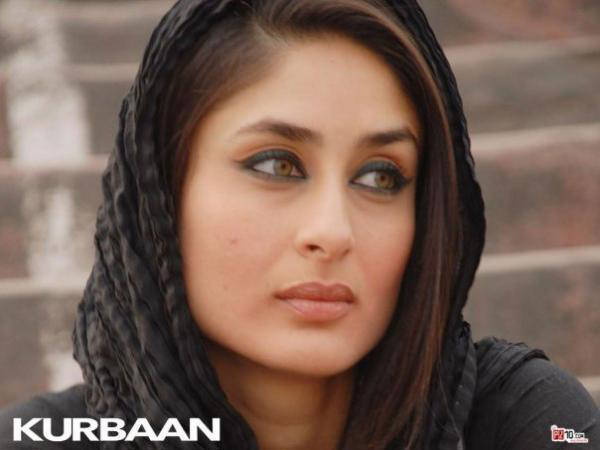Born into a family where both her parents, Randhir Kapoor and Babita, and her elder sister Karisma were actors, Kapoor faced the media spotlight from a very young age, but did not make her acting debut until the 2000 film Refugee. Her melodrama Kabhi Khushi Kabhie Gham... became India's highest-grossing film in the overseas market in 2001, and is one of her biggest commercial successes to date After receiving negative reviews for a series of repetitive roles, Kapoor accepted more demanding parts in order to avoid being typecast and was consequently recognized by critics for displaying greater versatility as an actress. Her portrayal of a sex worker in Chameli (2004) proved to be the turning point in her career and she was later noted for her performances in the critically acclaimed Dev (2004) and Omkara (2006).In 2007, Kapoor received her first Filmfare Award for Best Actress for her performance in Jab We Met, a romantic comedy directed by Imtiaz Ali. She went on to play the lead female role in the thriller Kurbaan (2009), for which she earned critical acclaim, and the drama 3 Idiots (2009), which became the highest-grossing Bollywood film of all time. Having done so, Kapoor has established herself as a leading actress of the Hindi film industry In addition to movie acting, Kapoor is a regular stage performer and has launched her own clothing line in association with being the brand ambassador for the retail chain Globus. Her off-screen life, including her relationship with actor Saif Ali Khan, is the subject of wide media coverage in India
Contents* 1 Early life and background
* 2 Acting career
o 2.1 Debut and breakthrough (2000–03)
o 2.2 Critical acclaim (2004–06)
o 2.3 Jab We Met and other works (2007–present)
* 3 Off-screen work
o 3.1 Stage performances
o 3.2 Humanitarian work
o 3.3 Clothing line
* 4 In the media
* 5 Filmography
* 6 References
* 7 Further reading
* 8 External linksEarly life and backgroundSee also: Kapoor familyBorn in Mumbai, India, on September 21, 1980, into the Kapoor film family, Kapoor is the youngest daughter of actors Randhir Kapoor and Babita (née Shivdasani); her elder sister Karisma Kapoor, is also an actress. She is the granddaughter of actor and filmmaker Raj Kapoor, great-granddaughter of actor Prithviraj Kapoor, and niece of actor Rishi Kapoor According to Kapoor, the name "Kareena" was derived from the book Anna Karenina, which her mother read while she was pregnant with her Often informally referred to as Bebo she is of Punjabi Khatri descent from her father's side,and on her mother's side she is SindhiAs a child, she had strong aspirations to become an actress, and was particularly inspired by watching the films of Bollywood actresses Nargis and Meena Kumari Kapoor, who describes herself as a "very naught spoilt child", would regularly dress up in her mother's clothes and perform in front of the mirror Despite her family background, her father disapproved of women entering the acting profession because he believed it conflicted with the traditional maternal duties and responsibility of women in the family. This led to a conflict between her parents and resulted in Kapoor's mother leaving the house with her two daughters After her parents' separation, she was raised in Lokhandwala by her mother, who worked several jobs to support her daughters until Karisma debuted as an actress in 1991 In an interview with Vir Sanghvi, Kapoor said that growing up in a household filled with women helped her become strong and independent Following her parents' reconciliation in October 2007Kapoor explained that they "were never officially divorced Asked about the relationship she shared with her father, Kapoor remarked, "My father is ... an important factor in my lifethough we did not see him often in our initial years, we are a family nowKapoor attended Jamnabai Narsee School in Mumbai before progressing to Welham Girls Boarding School in DehradunShe later recalled, "I learnt so much from being at Welham", and described her experience there as "one of the finest parts of my lif According to Kapoor, she was a good student and received first-class honours in all subjects except mathematics Upon graduating from the boarding school, she studied commerce for two years at Mithibai College in Vile Parle, Mumbai, but later confessed that she only studied there because she was close to her family Kapoor then registered for a three-month summer course in microcomputers at Harvard University in the United StatesShe later developed an interest in law and enrolled at the Government Law College in Churchgate; during this period she became immersed in law books and developed a long-lasting passion for readingHowever, after completing one year at Churchgate, Kapoor realized that she was not inclined towards academics and returned to her initial plan to become an actressShe began training at an acting institute in Andheri, mentored by Kishore Namit Kapoor, a member of the Film and Television Institute of India Acting careerDebut and breakthrough (2000–03)Kapoor was initially scheduled to make her debut in Rakesh Roshan's Kaho Naa... Pyaar Hai (2000), opposite the director's son Hrithik Roshan Several days into the filming, however, she abandoned the project and later explained that, "it was probably destined that I was not to be in the film. After all, it was a launch for his son. The whole focus was on the boy. Now I am glad I did not do the movie
She made her debut later that year in J.P. Dutta's war drama Refugee, alongside Abhishek Bachchan. Set during the Indo-Pakistani war of 1971, the film centers on a man known simply as "Refugee", who illegally transports civilians back and forth across the Indo-Pakistani border. Kapoor portrayed Naaz, a Bangladeshi girl who falls in love with Refugee while illegally migrating to Pakistan with her family. Her performance was acclaimed by critics; Taran Adarsh of Bollywood Hungama wrote that Kapoor "has a magnetic personality, which will make the viewer fall in love with her instantly. What surprises you is the ease with which she emotes the most difficult of scenes There is no denying the fact that she is a natural performer who is very camera friendly On the experience of making her first film, she described it as "...toughalso a great learning experience Refugee became the fifth highest-grossing film in India in 2000and Kapoor's performance earned her the Filmfare Award for Best Female DebuIn 2001, Kapoor appeared opposite Tusshar Kapoor in the romantic drama Mujhe Kucch Kehna Hai, which became one of the highest earners of the year A review in The Hindu, in regards to her performance, noted that she was "definitely the actress to watch out for, if her debut with Abhishek in Refugee and now Mujhe Kucch Kehna Hai are any indication Kareena shines throughout the flick, with the grace of a seasoned sizzler already next starred in Subhash Ghai's family drama Yaadein alongside Jackie Shroff and Hrithik Roshan. The drama centers on the character of Raj Singh Puri, a middle-class man, and his daughters' marriages. Kapoor played the part of the youngest daughter and Roshan's love interest, Isha Singh Puri. The film was met with negative reactions from reviewers and garnered poor box office returns.Kapoor then appeared in the Abbas-Mustan thriller Ajnabee. The feature was adapted from the 1992 American thriller film Consenting Adults, and was a moderate box office success in IndiaLater in the year, she starred in Santosh Sivan's period epic Asoka, a partly fictionalized account of the life of Ashoka the Great. It was widely screened across the United Kingdom and North America, and was also selected for screening at the Venice Film Festival and the 2001 Toronto International Film Festiva Featured opposite Shahrukh Khan who played Ashoka, Kapoor portrayed the character of Kaurwaki, a princess of Kalinga with whom Ashoka falls in love, and received her first Filmfare Best Actress nominationWhile the film received generally positive reviews, Kapoor's performance received a mixed reaction from critics. Rediff.com concluded that "while a large portion of the first half is focused on the emerging romance between the runaway prince and herself and to their credit they do manage to whip up some on-screen chemistry, I am still unsure as to her acting abilities."[30] Meanwhile, David Rooney from Variety wrote, "Kapoor plays ornately tattooed Kaurwaki as a lively mix of flirtatious coquette and feisty warrior woman, kind of like J.Lo meets Michelle YeohKapoor's final release of 2001 was Kabhi Khushi Kabhie Gham..., a melodrama, in which she was featured as part of an ensemble cast that included Amitabh Bachchan, Jaya Bachchan, Shahrukh Khan, Kajol and Hrithik Roshan. Directed by Karan Johar, the movie was a major financial and critical success and became India's second highest-grossing film of the year, as well as Kapoor's highest-grossing movie up until then. It also performed well internationally and became the biggest Bollywood success of all time in the overseas market up until then, earning over Indian Rupee1,000 million (US$22.1 million) worldwide Kapoor's performance as "Poo", a good-natured but superficial girl, was described as "one of the main ... highlights of the filand her portrayal earned her a Filmfare Best Supporting Actress nominatioDuring 2002 and 2003, Kapoor experienced a setback in her career. She was in six films—Mujhse Dosti Karoge!, Jeena Sirf Merre Liye, Talaash: The Hunt Begins..., Khushi, Main Prem Ki Diwani Hoon, and the four-hour war epic LOC Kargil—all of which proved critically and commercially unsuccessful in India Kapoor's performances were often identified by critics as unoriginal and repetitive, with little inspiration They expressed concern that she was becoming typecast, but these negative reviews were fundamental in motivating her to improve her integrity as an actress in subsequent years by accepting more demanding role
Critical acclaim
 kareena kapoor
kareena kapoor kareena kapoor
kareena kapoor kareena kapoor
kareena kapoor kareena kapoor
kareena kapoor kareena kapoor
kareena kapoor kareena kapoor
kareena kapoor kareena kapoor
kareena kapoor kareena kapoor
kareena kapoor kareena kapoor
kareena kapoor kareena kapoor
kareena kapoor kareena kapoor
kareena kapoor kareena kapoor
kareena kapoor kareena kapoor
kareena kapoor kareena kapoor
kareena kapoor kareena kapoor
kareena kapoor kareena kapoor
kareena kapoor
kareena kapoor















